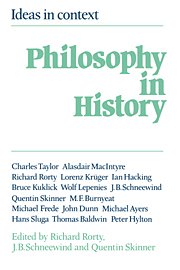Book contents
- Frontmatter
- Contents
- Dedication
- Preface
- Notes on contributors
- Introduction
- PART I
- PART II
- 10 The sceptic in his place and time
- 11 The sceptic's two kinds of assent and the question of the possibility of knowledge
- 12 The concept of “trust” in the politics of John Locke
- 13 Berkeley and Hume: a question of influence
- 14 Frege: the early years
- 15 Moore's rejection of idealism
- 16 The nature of the proposition and the revolt against idealism
- Index
11 - The sceptic's two kinds of assent and the question of the possibility of knowledge
Published online by Cambridge University Press: 03 December 2009
- Frontmatter
- Contents
- Dedication
- Preface
- Notes on contributors
- Introduction
- PART I
- PART II
- 10 The sceptic in his place and time
- 11 The sceptic's two kinds of assent and the question of the possibility of knowledge
- 12 The concept of “trust” in the politics of John Locke
- 13 Berkeley and Hume: a question of influence
- 14 Frege: the early years
- 15 Moore's rejection of idealism
- 16 The nature of the proposition and the revolt against idealism
- Index
Summary
Traditionally one associates scepticism with the position that nothing is, or can be, known for certain. Hence it was only natural that for a long time one should have approached the ancient sceptics with the assumption that they were the first to try to establish or to defend the view that nothing is, or can be, known for certain, especially since there is abundant evidence which would have seemed to bear out the correctness of this approach. After all, extensive arguments to the effect that there is no certain knowledge or that things are unknowable play a central role in our ancient sources on scepticism. And thus Hegel, Brandis, Zeller, and their successors were naturally led to take these arguments at face value and to assume that the sceptics were trying to show that nothing can be known. Closer consideration of the matter, though, shows that it cannot have been the position of the major exponents of ancient scepticism, whether Academic or Pyrrhonean, that nothing is, or can be, known. And this for the simple reason that the major ancient sceptics were not concerned to establish or to defend any position, let alone the position that nothing is, or can be, known. In fact, they went out of their way to point out that, though they produced arguments for it, they did not actually take the position that nothing can be known (cf. S.E., PH 1. 200–1).
- Type
- Chapter
- Information
- Philosophy in HistoryEssays in the Historiography of Philosophy, pp. 255 - 278Publisher: Cambridge University PressPrint publication year: 1984
- 37
- Cited by



